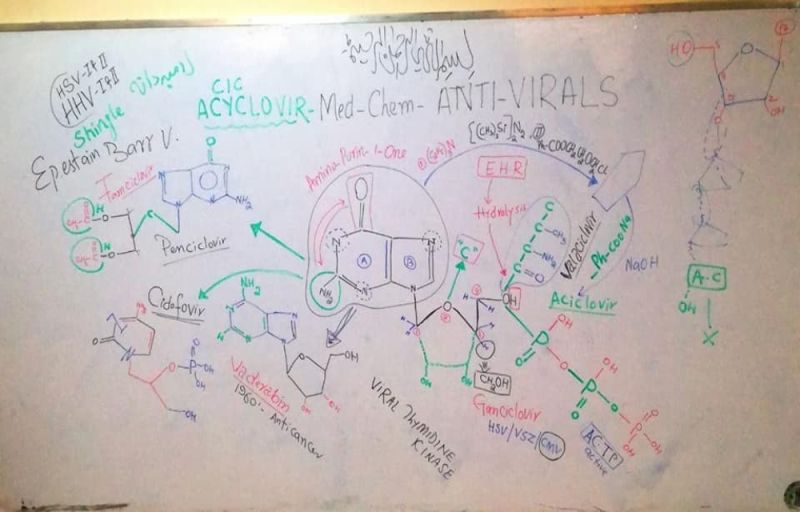Antivirals
Why are there so few antivirals? The answer boils down to biology, and specifically the fact viruses use our own cells to multiply. This makes it hard to kill viruses without killing our own cells in the process - Christine Carson & Rachel Roper

image by: Naveed Muhammad
HWN Suggests
Developing antiviral drugs is not easy – here’s why
The reason there are few effective broad-spectrum antivirals is that viruses are much more diverse than bacteria, including in how they store their genetic information (some in the form of DNA and some as RNA). Unlike bacteria, viruses have fewer of their own protein building blocks that can be targeted with drugs.
For a drug to work, it has to reach its target. This is particularly difficult with viruses because they replicate inside human cells by hijacking our cellular machinery. The drug needs to get inside these infected cells and act on processes that are essential for the normal functioning of the human body. Unsurprisingly, this often results in collateral damage to human…
Resources
 For an antiviral researcher, Covid brings a flood of attention — and opportunity
For an antiviral researcher, Covid brings a flood of attention — and opportunity
Researchers seeking to develop antivirals have long warned that a new virus could wreak disaster around the globe and sought funding for their work, only to be largely ignored. Now, the Covid-19 pandemic has unleashed a flood of new money for studies on antivirals, with interest surging from both the government and industry.
 What are antiviral drugs and how do they work?
What are antiviral drugs and how do they work?
Antiviral medications have been around since the 1960s in the form of pills, intravenous solutions, ointments and even eye drops. They exist for only a handful of viruses, including H.I.V., the herpes simplex viruses, hepatitis B and C viruses, influenza A and B, and now the coronavirus.
COVID: antiviral drugs are a vital weapon – but misusing them could backfire
The “living with COVID” strategy being pursued by many countries relies heavily on two key pillars. First, that vaccines continue to protect most people from severe disease. And second, that where they don’t, people will receive antiviral treatments. But are the antivirals currently available sufficiently effective, accessible and durable?
Why are there so many drugs to kill bacteria, but so few to tackle viruses?
Why are there so few antivirals? The answer boils down to biology, and specifically the fact viruses use our own cells to multiply. This makes it hard to kill viruses without killing our own cells in the process.
 Developing antiviral drugs is not easy – here’s why
Developing antiviral drugs is not easy – here’s why
Unlike broad-spectrum antibiotics, which can be used to treat a wide range of bacterial infections, drugs that work against one type of virus rarely work at treating other viruses. For example, remdesivir, originally developed for treating hepatitis C, was at one point suggested as a treatment for COVID, but clinical trials have shown that it has only a limited effect against this coronavirus.
Ebola
The recommendation follows review and analysis of clinical trials for the monoclonal antibodies mAb114 (known as Ansuvimab or Ebanga) and REGN-EB3 (Inmazeb), which have demonstrated clear benefits for people who have tested positive for Ebola, which is often fatal.
Hep B
There are currently 7 approved drugs in the United States for adults living with chronic hepatitis B infection. These include 5 types of antiviral drugs that are taken as a pill once a day for 1 year or longer. And there are 2 types of immune modulator drugs called “interferon” that are given as an injection for 6 months to 1 year.
Hep C
Antiviral medicine eliminates hepatitis C in 97% of patients, but Stanford Medicine researchers and colleagues find that many don’t receive the treatment.
Herpes Simplex
Acyclovir is an agent used to treat infections caused by the herpes simplex virus (HSV). It is FDA approved to treat genital herpes and HSV encephalitis. Non-FDA-approved indications are mucocutaneous HSV, herpes zoster (shingles), and varicella-zoster (chickenpox). Acyclovir is the first-line treatment for HSV encephalitis.
HIV
Recent advances in treatment and prevention of HIV warrant updated recommendations to guide optimal practice.

Introducing Stitches!
Your Path to Meaningful Connections in the World of Health and Medicine
Connect, Collaborate, and Engage!
Coming Soon - Stitches, the innovative chat app from the creators of HWN. Join meaningful conversations on health and medical topics. Share text, images, and videos seamlessly. Connect directly within HWN's topic pages and articles.













